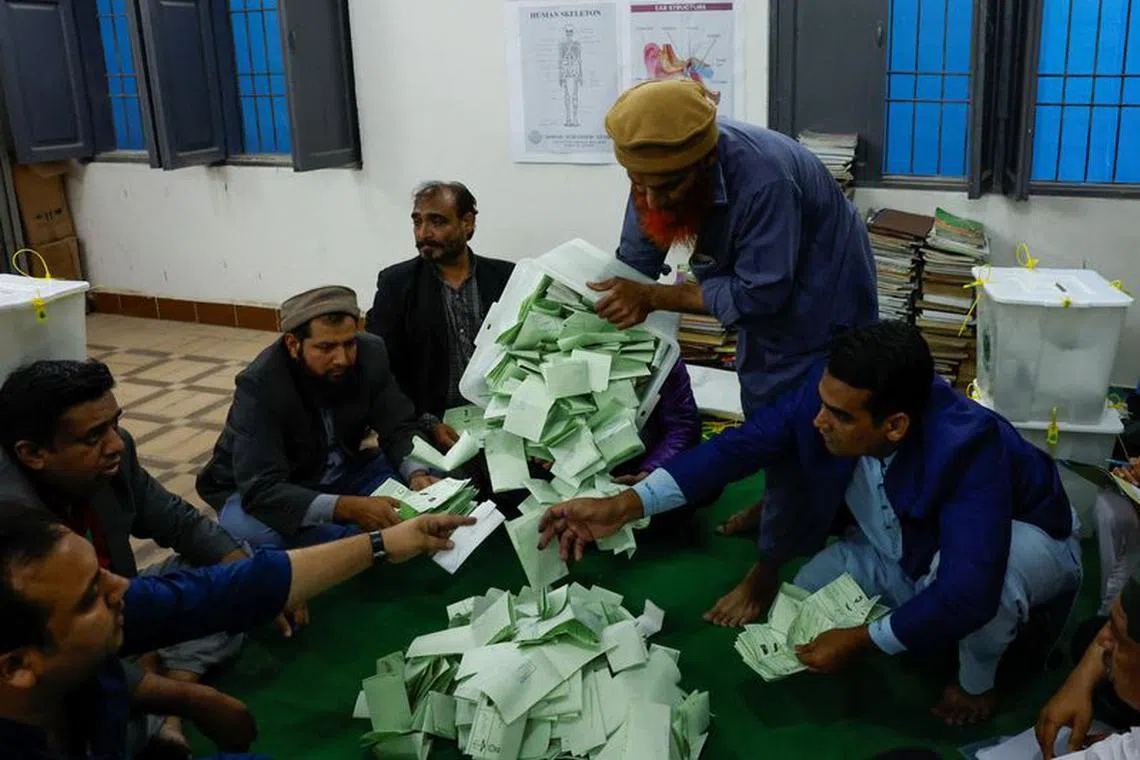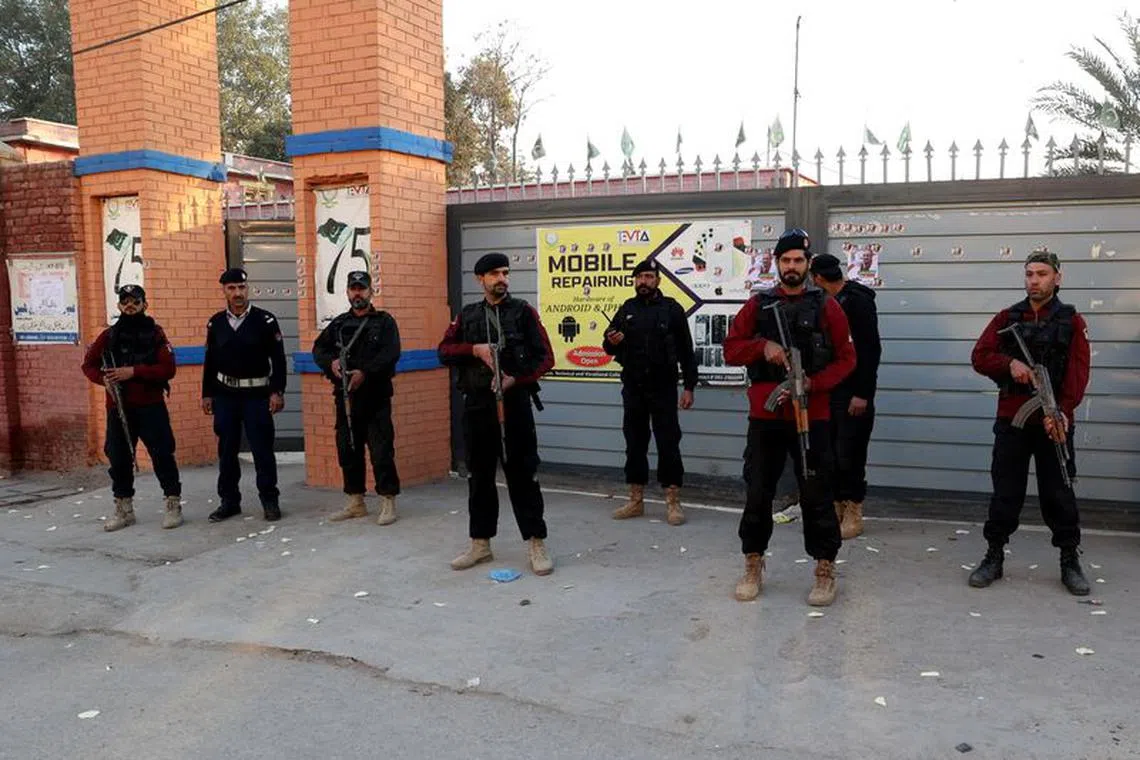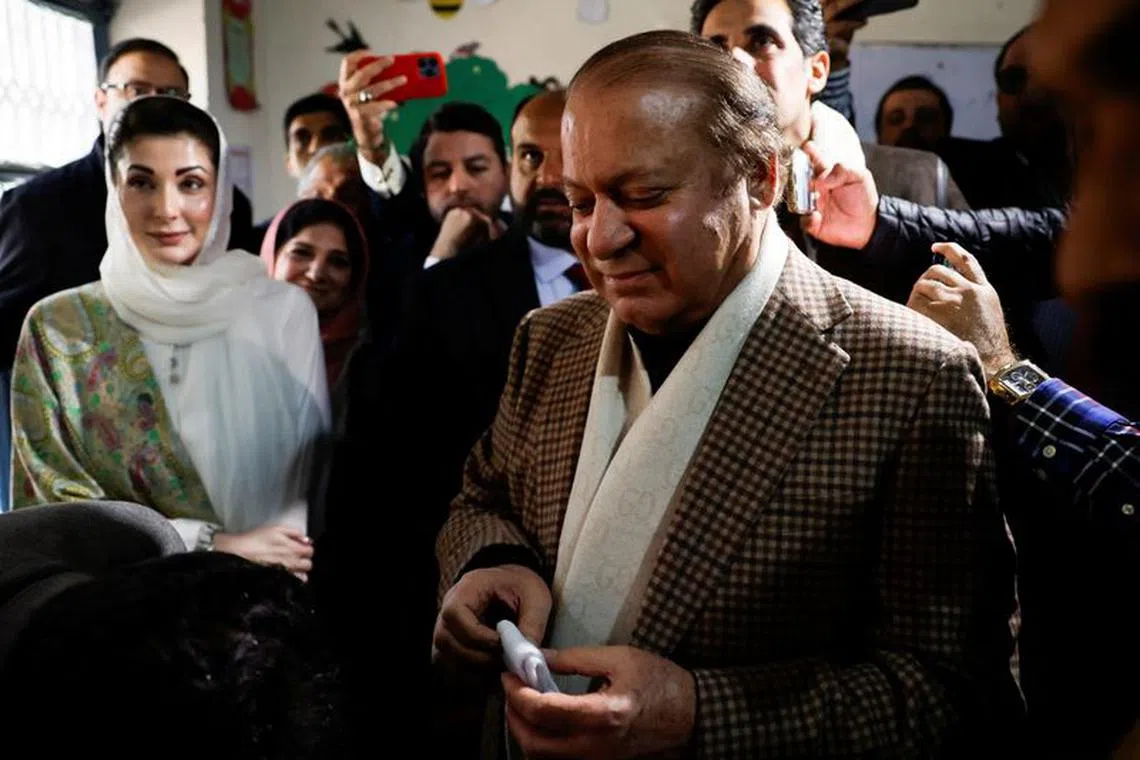Pakistan’s former PM Nawaz Sharif declares victory in national elections
Sign up now: Get insights on Asia's fast-moving developments

Polling officers counting ballot papers during Pakistan's general election in Karachi on Feb 8.
PHOTO: REUTERS
ISLAMABAD - Pakistan’s former prime minister Nawaz Sharif on Feb 9 claimed victory in the Feb 8 national elections, saying his political party has emerged as the largest in the vote and will discuss forming a coalition government.
Mr Sharif did not disclose how many seats his party had won and counting was still under way in the last few of the 265 seats that went to the polls.
The latest count published by the election panel showed his Pakistan Muslim League-Nawaz (PML-N) winning 61 seats, much below the 133 mark needed to stake claim to form a government.
Mr Sharif said his party alone does not have the seats needed, but his deputies will meet leaders of other parties later in the day, including former president Asif Ali Zardari of the Pakistan Peoples Party (PPP), to discuss forming a coalition government.
If the two family-based parties join forces, it could thwart jailed former premier Imran Khan
“We have to sit down together,” Mr Sharif said at his family stronghold in Lahore. “It’s the duty of everybody to take this country out of this quagmire.”
PML-N is the largest party in Parliament, Mr Sharif said. His close aide said earlier that PML-N will win close to 90 out of the 265 seats up for grabs in the National Assembly, Pakistan’s Lower House.
“We will talk to everybody,” Sherry Rehman, a PPP senator and senior leader, told reporters in Lahore.
Khan’s supporters had the edge in results from over 100 seats earlier in the day, after vote counts were hit by unusual delays that the government ascribed to a suspension of mobile phone services.
Geo News said independents, who mostly owe allegiance to Khan, had won 47 of 106 seats for which it had results. A total of 265 seats were contested in the Feb 8 election.
By 0800 GMT (4pm in Singapore), the Election Commission of Pakistan (ECP) had announced 70 official results, with independents getting 24. The PPP of Mr Bilawal Bhutto Zardari, son of assassinated premier Benazir Bhutto, also bagged 24, while former Mr Sharif’s PML-N won 18.
The rest were won by small parties.
Khan is in jail, and his Pakistan Tehreek-e-Insaf (PTI) party was barred from the election
Analysts have predicted there may be no clear winner, adding to the woes of a country struggling to recover from an economic crisis while it grapples with rising militant violence in a deeply polarised political environment.
“A timely announcement of the results, leading to a smooth formation of a new government, will reduce policy and political uncertainty,” Moody’s Investors Service has said. “This is crucial for the country that is facing very challenging macroeconomic conditions.”
Mr Zafar Iqbal, special secretary at the ECP, said without elaborating that an “Internet issue” was the reason behind the delay in results.
The government said it had suspended mobile phone services ahead of the election as a security measure, and they were being partially resumed.
The main battle was expected to be between candidates backed by Khan, whose PTI party won the last national election, and the PML-N of Mr Sharif, who analysts say is being backed by the powerful military.
The military has dominated nuclear-armed Pakistan either directly or indirectly in its 76 years of independence.
Mr Sharif, considered by many observers to be a strong candidate, dismissed talk of an unclear result, but a close aide, Mr Ishaq Dar, told GEO TV that the party could form a coalition with the support of independents.
“I am confident that we will form a government,” Mr Dar said.
Steadying the ship
If the election does not result in a clear majority for anyone, as analysts are predicting, tackling multiple challenges will be tricky – foremost being seeking a new bailout programme
“The deciding factor is which side the powerful military and its security agencies are on,” said Mr Abbas Nasir, a columnist, commenting on the likelihood that no party would emerge as a clear winner. “Only a huge turnout in favour of (Khan’s) PTI can change its fortunes.”
He added: “Economic challenges are so serious, grave, and the solutions so very painful that I am unsure how anyone who comes to power will steady the ship.”

Police officers standing guard outside a polling station in Gulbahar area in Peshawar, Pakistan, on Feb 8.
PHOTO: REUTERS
Thousands of troops were deployed on the streets and at polling stations across the country on Feb 8. Borders with Iran and Afghanistan were temporarily closed as security was stepped up to ensure peaceful polling.
Despite the heightened security, 12 people, including two children, were killed in 51 bomb blasts, grenade attacks and shootings by militants, mostly in the western provinces, the military said in a statement.
The victims included five police officers killed in a bomb blast and firing on a patrol in the Kulachi area of Dera Ismail Khan district in the north-west, the authorities said. Two children died in a blast outside a women’s polling station in Balochistan province.
“Despite a few isolated incidents, the overall situation remained under control, demonstrating the effectiveness of our security measures,” caretaker Interior Minister Gohar Ejaz said in a statement.
US State Department deputy spokesman Vedant Patel told reporters that Washington was concerned about “steps that were taken to restrict freedom of expression, specifically around Internet and cellphone use”.
The United States strongly condemned election-related violence both in the run-up to the polls and on election day, Mr Patel added.
United Nations Secretary-General Antonio Guterres also expressed concern about the violence and the suspension of mobile communications services.

Former prime minister Nawaz Sharif smiling as he casts his vote at a polling station during the general election in Lahore on Feb 8.
PHOTO: REUTERS
Amnesty International called the suspension of mobile services “a blunt attack on the rights to freedom of expression and peaceful assembly”.
Chief Election Commissioner Sikandar Sultan Raja said the decision on mobile networks was made by “law and order agencies” following violence on Feb 7 in which 26 people were killed. REUTERS


